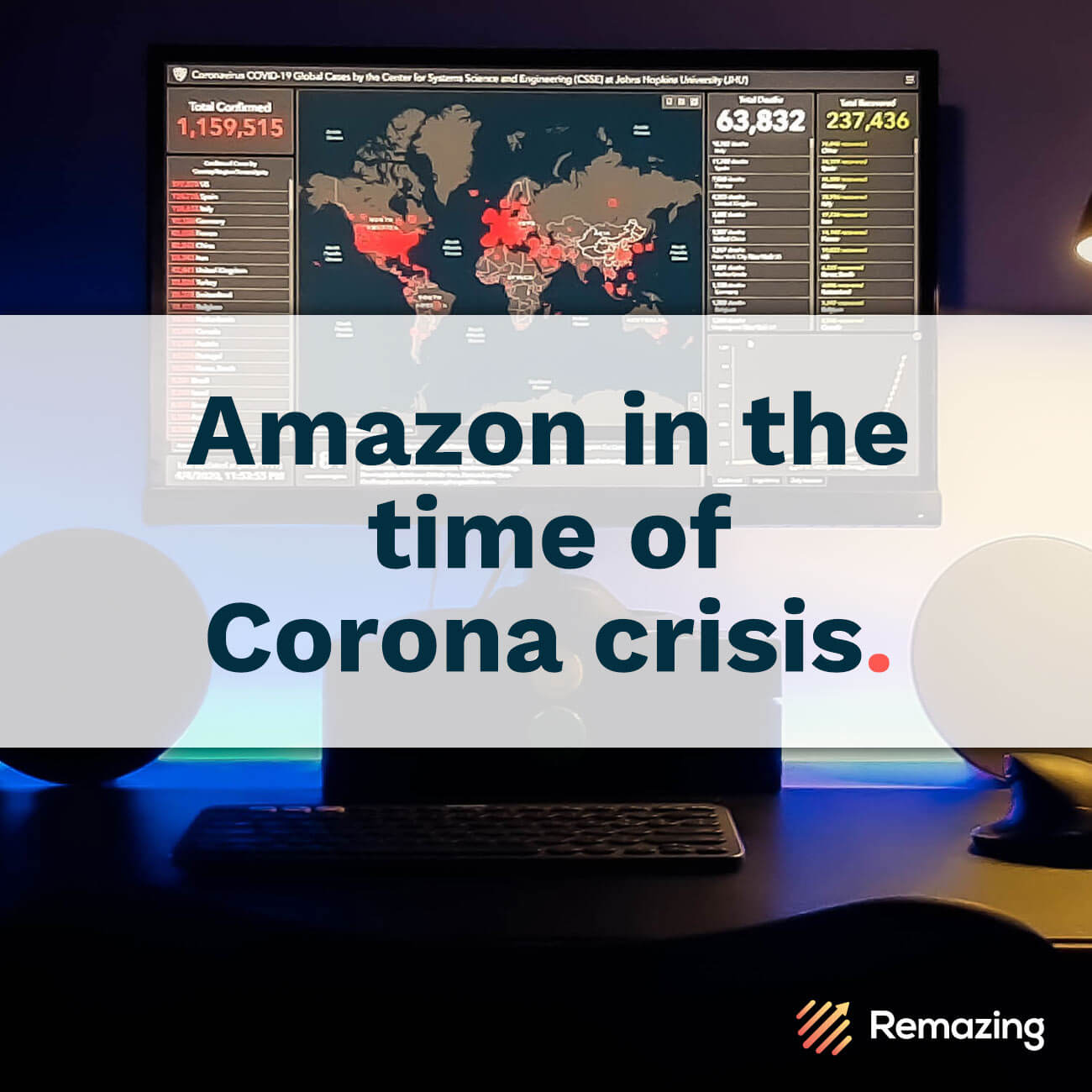
Amazon in times of the Corona crisis: How brands should react now

How the online giant Amazon is reacting to the changing search and purchasing behavior of consumers as a result of the Corona crisis and how brand manufacturers can adapt to the dynamic market conditions. Emil Beck, managing director of the Amazon agency Remazing, analyzes the status quo and gives recommendations for action.
It is a challenging time for all of us: the news about the new coronavirus is spreading day by day. What is true today may not be true tomorrow. This also applies to the economy and online trade. In this context, Amazon has seen a significant change in consumer search and purchasing behaviour and has reacted to this development with drastic measures.
Sequence of Events: The search terms indicate that something is wrong
The current most frequently entered search terms on Amazon in Germany illustrate the extent to which and the direction in which the demand and purchasing behaviour of Amazon users has changed. In Q4 2019 there was nothing unusual to be seen in the search queries with “Advent calendar” as the most frequent search term (see chart). If one takes a look at the searches in January 2020, it is already noticeable that the second most frequent search term is “facemask”. One year earlier, in January 2019, it was still ranked 2,132th of all search queries. The trend continues in February 2020 due to the worsening corona crisis. Normally, search queries for carnival articles tend to dominate in February, but this year “disinfectant”, “face mask” and “respiratory protection mask” are the most popular search terms for German Amazon users. The latest figures from the beginning to the middle of March (08.03.-14.03) show that in the meantime “toilet paper” has become the most searched term. If you look at the top 5 search terms from February onwards, you will see that all terms can be clearly attributed to the corona crisis.
The unprecedented change in search behaviour reveals that there is currently a shift in demand for certain product groups on Amazon. Brand manufacturers from the FMCG (Fast Moving Consumer Goods) sector, especially drugstore products and food, are benefiting particularly strongly from this.
How is Amazon reacting to the crisis?
1. Amazon plans to hire more than 100,000 new employees
One of Amazon’s most important success factors is having enough products in stock and to deliver them at the usual “prime” speed. It is precisely this convenience that sets Amazon apart from the rest of the online trade. The sudden increase in demand in the wake of the Corona crisis has meant that this promise could no longer be kept in the US domestic market. For this reason, Amazon has announced that it is filling more than 100,000 new full and part-time positions in warehousing and logistics in the USA alone. By way of comparison, this is equivalent to the core workforce at Google and roughly the same number of employees at Deutsche Telekom in Germany. It would not be surprising if Amazon expanded its workforce in the European market as well in the near future.
2. Amazon restricts certain deliveries of goods in the USA and Europe
To avoid supply bottlenecks for certain products, Amazon recently decided to take a drastic step. Whether FBA-Seller or Vendor: On March 17, it was announced that for the time being only certain product groups may be stored in its own warehouses until April 5, 2020. This affects both the USA and Europe. In accordance with the results of the above search term analysis, most of the products that are still accepted are from the following Amazon categories:
- Baby
- Pet supplies
- Food & beverages
- Beauty & personal care
- Health & household
- Industrial & scientific
3. Amazon strengthens its own brand during the crisis
In times of the Corona crisis, Amazon seems to have become even more indispensable for consumers. The two measures mentioned so far, the massive hiring of employees and the restriction of the delivery of goods, should ensure that the most popular products are available and reach the customer quickly. Especially now, when people are dependent on them. If Amazon delivers – in the truest sense of the word – the online giant is likely to see an enormous gain in confidence among new and old customer groups in the medium to long term. Other confidence-building measures include, for example, the fact that Amazon currently prominently links to the Robert Koch Institute in search queries such as “Coronavirus” and “Respirator” and that Amazon has announced, at the same time as the 100,000 new job vacancies to be filled, that it will increase the hourly wages of warehouse and logistics staff by $2 in the USA and around €2 in Europe.
What Remazing recommends for brand manufacturers in this critical phase
At present, many brand manufacturers are unsure how they should adapt their Amazon strategy in view of the complex situation and what measures they should focus on.
The following recommendations for action can help here:

Suscríbete a nuestra Newsletter ahora y recibe actualizaciones periódicas de Amazon y otras plataformas de e-commerce.
Suscribirse a la Newsletter ahora.
1. Analysis of the product portfolio
This forms the basis for further measures. Brand manufacturers should examine their product portfolio in terms of demand and supply aspects. Questions that serve as orientation here are:
- Do our products belong to the prioritized Amazon categories (see above)?
- Which of our products provide a particularly good “answer” to the highly demanded search terms?
- Which other products besides FMCG are well suited for home use and will therefore be in greater demand in the near future?
- Can we guarantee the production and supply chain of our products in the short and medium term?
The aim of the analysis should be to divide the products into different portfolios (e.g. “Winners”, “Question Marks”, “Losers”). The main focus should then continuously be on the product portfolio that has the highest probability of success. If a Vendor or FBA-Seller has products in its portfolio that are subject to Amazon’s restrictions on the delivery of goods, they can evaluate the short-term feasibility of the FBM model or drop-shipping if they have their own logistics expertise.
2. Regular keyword monitoring
With the help of Amazon tools (ARA Premium or Amazon Brand Analytics), brand manufacturers should track the most relevant keywords at least weekly to be able to react to the latest developments.
3. Content optimization
The content, especially product titles, A+ content and search terms, should be continuously adjusted based on the findings of keyword monitoring.
4. Adjustment of the advertising budget
Advertising budgets should be aligned with the potential of the product portfolios. This means that budgets for promising products should be increased, while campaigns for products from less demanded categories should be reduced. It is important that brand manufacturers keep an eye on margins at product level, as click prices can fluctuate greatly.
5. Interaction with consumers
Brand manufacturers should try to answer as many of the consumer’s questions as possible in a professional manner and react to reviews in order to strengthen customer confidence, especially in this difficult period.
Conclusion
The search and purchase behaviour on Amazon has changed during the Corona crisis and is currently increasingly shifting to the FMCG sector. Amazon seems to have quickly recognised the risks and opportunities that lie in this crisis and has taken far-reaching measures that could further strengthen the trust in the “Amazon” brand in the long term.
The FMCG industry in Germany has the lowest online share of the total market of all industries (according to HDE-Online-Monitor 2019: 2.2%). Given current developments, there is much to suggest that Amazon will gain significant market share in the FMCG sector.
Brand manufacturers have the challenge of continuously monitoring market developments and constantly questioning their own Amazon strategy. Companies that act with similar dynamism, foresight and decisiveness to Amazon in turbulent times like these could ultimately emerge stronger from the Corona crisis.
This article was first published as a feature at W&V.
¿Estás interesado en un análisis experto de tu cuenta en Amazon?
Solicitar análisis gratuitoArtículos relacionados
Remazing GmbH
Brandstwiete 1
20457 Hamburg
©Remazing GmbH



